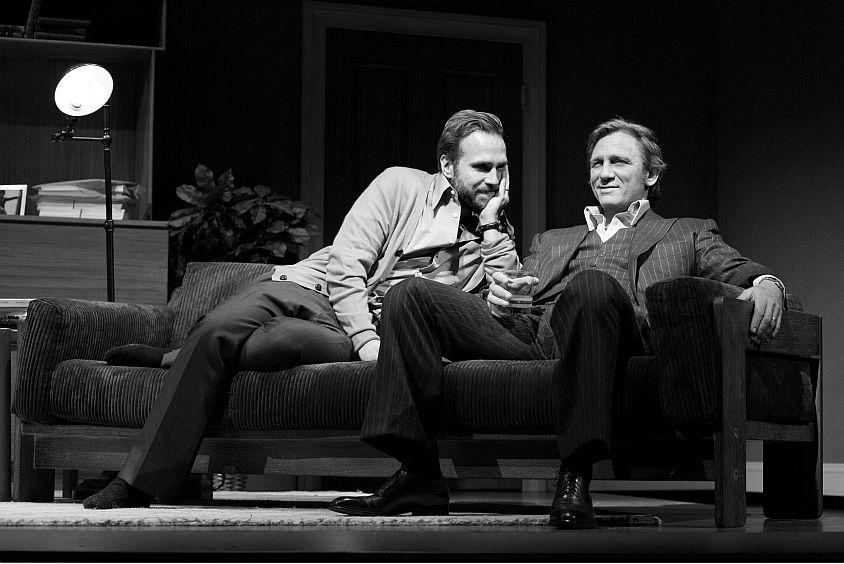NEW YORK—Carrying impressive star wattage, the Broadway revival of Harold Pinter’s “Betrayal” explores both the disintegration of a marriage as well as the beginning, middle, and end of an adulterous affair—though not always in that order.
Spanning 1977–1968 (seen mostly backward in time with occasional steps forward), the story begins with old flames Emma (Rachel Weisz) and Jerry (Rafe Spall) meeting several years after the end of their affair. Rachel now reveals that not only is her marriage to Robert (Daniel Craig) on the rocks, but also that he has known for years about her trysts with Jerry.
This realization shocks Jerry to the core and upsets his rather compartmentalized lifestyle; he tries to come to terms with a fact that the other two-thirds of this romantic triangle have long since accepted. It doesn’t help that Robert is also Jerry’s best friend.
However, for the plot device that is central to “Betrayal” to really take hold, the characters must be somewhat different at the end than at the beginning of the tale explored, and that is not the case here.
None of the three changes emotionally or seemingly learns anything from what they’ve just been through. It’s a problem that must be laid at least partly at the feet of director Mike Nichols; he is unable to help the actors get inside their characters’ heads and show the audience more than what’s written on the page.
There’s no denying the script offers great possibilities with material to be played for both comedy and drama—Spall doing the best in that regard. But lacking strong character development or emphasis on the nuances of what is being said, it’s hard to really become interested in the characters.
Jerry, for example, always seems to put his own needs first. He worries how things will affect him personally, but never really considers how the repercussions of his actions will affect others. He may worry about how Robert’s knowledge will alter their friendship, but the fact that Jerry was also married while he was sleeping with Emma never enters into his head as significant.
It certainly helps that Spall delivers some of the funniest lines in the play, but his character’s self-centered attitude, which is the same throughout, soon becomes annoying.
Craig falls into the same trap as Spall, though the two have good chemistry together, especially the first time they share the stage. Craig presents Robert as someone with a “live and let live” air, and who prides himself as rolling with the punches life throws him—an admirable quality. But there are times when something more is called for, and Craig doesn’t deliver more.
Though there are moments when something darker in Robert begins to emerge, such as when he continually invites Jerry for a game of squash, and the audience wonders if this is actually an offer of a friendly game or an excuse for Robert to humiliate Jerry, as Jerry has done to him, but these moments are rare.
Weisz’s character actually does change during the course of the play. Emma goes from a seeming woman of leisure—Robert is a well-respected book publisher—to someone who runs a gallery. Her increasing responsibilities take her away more and more from her afternoon assignations with Jerry at the flat they took for such purposes. The fact that toward the end of the affair Emma is able to get away with Jerry at all shows how important their relationship has become to her.
Yet Weisz is not really able to bring the various aspects of her character across effectively. She has an almost continual monotone delivery, as well as an extreme lack of chemistry with either Spall or Craig.
One of the major elements of a Pinter production is the tendency to leave with more questions than answers, so that the audience fills in the blanks of the possible scenarios the text has sketched out. Yet this is hard to do if those involved in the production are unable to make those watching care about what’s happening on stage.
It should be noted that this revival of “Betrayal” had pretty much sold out its run prior to opening, and everybody connected with the show will probably make a lot of money. However, the audience, many of whom may be going simply to see the star power of the actors, deserve better.
Ian MacNeil’s set design is nicely functional, matching the characters’ tastes and situations. The set of Robert’s home is a nice example of this.
Costumes by Ann Roth work well, especially the different outfits Emma wears as the play progresses.
Also in the cast is Stephen DeRosa.
Betrayal
Ethel Barrymore Theatre
243 West 47th Street
Tickets: 212-239-6200 or visit www.telecharge.com
Running Time: 1 hour, 30 minutes
Closes: Jan. 5, 2014
Judd Hollander is the New York correspondent for the London newspaper The Stage.





